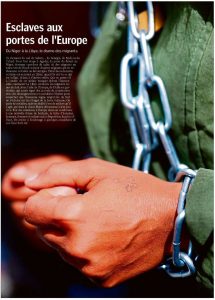Umzugshilfe nur in Notfällen (Weilerbach)
 OLAI-Direktor Yves Piron erläutert die Zuständigkeiten seiner Dienststelle
OLAI-Direktor Yves Piron erläutert die Zuständigkeiten seiner Dienststelle
VON ANNE-AYMONE SCHMITZ Luxemburger Wort 7. Februar 2018
Dass Flüchtlinge kurz vor Weihnachten aus dem Centre Héliar in Weilerbach ohne logistische Hilfe umziehen mussten, wurde von der Vereinigung Konterbont kritisiert. Für OLAI-Direktor Yves Piron ist diese Vorgehensweise nicht un- gewöhnlich.

 where and how long they want free from the constraints and costs of a normal classroom environment.
where and how long they want free from the constraints and costs of a normal classroom environment. Esclaves aux portes de l’Europe
Esclaves aux portes de l’Europe



